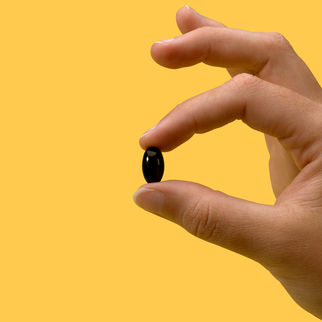Whether you're a fitness novice or a seasoned gym-goer, you've probably experienced muscle soreness after a strenuous workout. While it might not feel very good, it’s a great thing overall — the soreness is a sign that you've pushed your body and that it's working hard to repair and strengthen your muscles.
But did you know that what you consume post-workout can play a crucial role in your muscle recovery?
After an intense workout, your body enters a stage of recovery. During this time, it works to repair damaged muscle tissue and replenish your energy stores. The process will rely heavily on certain nutrients, like protein and carbohydrates, so you’ll need to take that into consideration when planning your next workout.
Consuming the right foods and supplements accelerates muscle recovery and fuels muscle growth, helping you get the most from your workout. In this article, we'll explore 12 foods that are especially beneficial for post-workout recovery and how they aid in building muscle and restoring energy.
Why Does Nutrition Matter for Muscle Recovery?
When you perform a high-intensity workout, your muscles undergo microscopic damage — this is what causes muscle soreness. During recovery, the body repairs this damage, leading to muscle growth and strength gains — but it needs the right building blocks to do so effectively, and that's where nutrition comes in.
The two key nutrients for muscle recovery are protein and carbohydrates.
Protein provides the amino acids that serve as the building blocks for muscle repair and growth. During an intense workout, your muscles are strained, and tiny tears occur in the muscle fibers. Protein helps repair these tears, allowing your muscles to grow stronger. Consuming sufficient protein post-exercise also supports muscle protein synthesis, the process your body uses to rebuild and strengthen muscle tissue.
Carbohydrates serve a different purpose than protein. When you exercise, your body burns through its glycogen stores — the primary energy source for your muscles. Consuming carbohydrates after a workout replenishes these glycogen stores, restoring energy and preparing your muscles for your next workout. Without sufficient carbohydrates, your body might start breaking down muscle tissue for energy, counteracting your muscle-building efforts.
Hydration is another key aspect of post-workout recovery. When you sweat, you lose not just water but also essential electrolytes, like potassium and magnesium — and these are vital for muscle function. Drinking enough water and rehydrating with sports drinks can help replace these lost electrolytes, prevent muscle cramps, and enhance recovery.
Antioxidants are another key element as they play a defensive role in muscle recovery. Exercise triggers oxidative stress in your body, producing free radicals. While some free radicals are essential for health, an overload can cause damage to your muscle tissue. Antioxidants help keep your cells healthy during exposure to free radicals, soothing the body and supporting overall muscle recovery.
The 12 Best Foods for Muscle Recovery
As you can see, proper nutrition is an essential part of muscle recovery. Whenever you plan your post-workout meals, consider incorporating these top 12 foods as they offer the essential nutrients your body needs for muscle recovery:
1. Greek Yogurt
With a reputation as a protein powerhouse, Greek yogurt is highly beneficial for muscle repair and growth, supplying much-needed amino acids. Its versatility makes it desirable for those looking to improve muscle recovery.
Enjoy it as a standalone snack, a breakfast staple, or a smoothie base. Mix in antioxidant-rich fruits such as blueberries or a drizzle of honey for added benefits and flavor. The creamy texture and satisfying taste make it an easy addition to your post-workout routine.
2. Cottage Cheese

A fantastic source of high-quality protein, cottage cheese provides casein, a slow-digesting protein. This slow digestion ensures a steady supply of amino acids to your muscles, making it a perfect snack before bed to support overnight muscle recovery.
Apart from being high in protein, cottage cheese also contains calcium which further aids muscle function. It can be paired with fresh fruits for a nutrient-dense snack or included in savory dishes for a protein boost.
3. Sweet Potatoes
These vibrant tubers are a superb source of complex carbohydrates, providing your body with the glucose it need to replenish glycogen stores post-workout.
Sweet potatoes also boast a high vitamin C content, crucial for collagen production, a vital building block of muscle tissue. Whether roasted, steamed, or mashed, sweet potatoes are a delicious and nutritious addition to your post-exercise meal.
4. Watermelon
This hydrating fruit is made up of 90 percent water (hence the name) and greatly aids in rehydration after physical activity. Watermelon is also a source of citrulline, a natural substance that may help to alleviate muscle soreness.
It's refreshing, naturally sweet, and perfect for a quick post-workout snack, making it a great option for refueling your body and refreshing your palate.
5. Blueberries
These small fruits are antioxidant powerhouses, helping to curb muscle damage and tension caused by rigorous workouts.
They’re easy to include in your diet — just toss a handful into your Greek yogurt or protein shake, or simply snack on them post-exercise for a sweet yet healthful boost.
6. Quinoa
Not your average grain, quinoa is a nutritional gem. Along with being a fantastic source of carbohydrates, it's also rich in high-quality protein, containing all nine essential amino acids, thus classifying it as a complete protein.
This unique combination of nutrients makes quinoa an excellent choice for muscle repair and recovery. It's delicious when used as a base for salads, served as a side dish, or even added to breakfast bowls for an early protein hit.
7. Chia Seeds
These tiny, nutrient-dense powerhouses are packed with ALA, the precursor to omega-3 fatty acids which help soothe tension, ultimately aiding muscle recovery. Their ability to absorb large amounts of water helps to enhance hydration and maintain electrolyte balance, which is especially beneficial after an intense workout.
Chia seeds are incredibly versatile and can easily be added to your smoothies, yogurts, or even a simple glass of water to create a nutrient-rich chia pudding.
8. Whole Grains
Foods such as brown rice and oatmeal are exceptional for muscle recovery due to their slow and steady release of glucose.
Additionally, whole grains are rich in dietary fiber, which supports digestion and weight management by keeping you feeling satiated. Experiment with various whole grains such as quinoa, barley, and whole grain bread for a healthy post-workout meal.
9. Leafy Greens

Dark green vegetables such as spinach and kale are a nutritionist's dream. They provide essential vitamins and minerals, including calcium for muscle function and iron for delivering oxygen to your muscles.
Incorporating leafy greens into your diet can boost overall health and aid muscle recovery. Enjoy them in a fresh salad, blend them into a green smoothie, or lightly sauté them for a warm side dish.
10. Egg Yolks
Contrary to popular belief, the yolk is where many of the nutrients in an egg are found. It's home to half the egg's protein content and is rich in essential vitamins and minerals.
Egg yolks are an excellent source of leucine, an amino acid crucial for muscle protein synthesis. Whether you enjoy them boiled, scrambled, or poached, eggs make a delicious and nutritious post-workout meal.
11. Tart Cherry Juice
This ruby-red beverage has gained a following among athletes for its ability to reduce muscle soreness and speed up recovery. Its high antioxidant and tension-soothing properties are attributed to the presence of anthocyanins, a type of flavonoid.
Sipping on tart cherry juice post-exercise could be a tasty way to soothe those tired muscles.
12. Protein Shake with Whey Protein
Whey protein is a high-quality, fast-digesting protein source, making it a favorite for muscle recovery. Mixing some protein powder into a shake or smoothie is an easy, convenient, and delicious way to get a large amount of protein (20 to 30 grams per scoop).
Combine it with fruits such as bananas or berries for added health benefits and flavor, and you've got yourself a perfect post-workout refuel option.
What Is the Role of Supplements in Muscle Recovery?
While whole foods should form the foundation of your post-workout nutrition, supplements can also play a valuable role in supporting muscle recovery. High-quality supplements, as recommended by a dietitian, can provide a convenient way to ensure you're getting the necessary nutrients.
One such supplement to consider is omega-3 fatty acids. These fatty acids, found in abundance in fish, flaxseeds, and algae, are known for their soothing properties, which can help ease muscle soreness and tension. They also support muscle function and overall wellness.
Additionally, a well-rounded multivitamin can help supply essential vitamins you might not get from your diet.
Incorporating Muscle Recovery Foods into Your Diet
Understanding the connection between nutrition and muscle recovery is key to getting the most out of your workouts and promoting overall wellness. The right foods and supplements, chosen for their high-quality nutrients, can greatly aid in your post-exercise recovery.
By incorporating these muscle recovery foods into your diet, you're ensuring that your body has the tools it needs to heal, grow, and be ready for your next workout. Remember, the journey to wellness isn't just about exercise, it's also about nutritious food and mindful recovery.
As you plan your wellness journey, consider the role that iwi life's plant-based omega-3 supplements can play. With sustainable, algae-derived omega-3 fatty acids, iwi life supplements offer a convenient way to support your body's recovery. Backed by science and loved by wellness enthusiasts, these supplements can complement a balanced diet and help you take an important step toward optimizing your health.
Give them a try and see how they can support your wellness journey!
Sources:
How Does Exercise Make Your Muscles Stronger? | Scientific American
Protein For Exercise and Recovery | NCBI Bookshelf
Free Radicals, Antioxidants in Disease and Health | PMC
Casein: A Milk Protein With Diverse Biologic Consequences | NCBI Bookshelf
Collagen: What it is, Types, Function & Benefits | Cleveland Clinic
l-Citrulline Supplementation: Impact on Cardiometabolic Health | PMC
The Health Benefits of Dietary Fibre | PMC
Calcium Regulation of Muscle Contraction | PMC



















